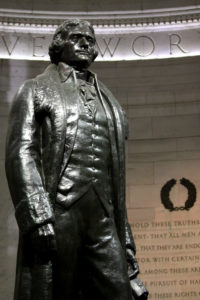We gather together to ask the Lord’s blessing;
He chastens and hastens His will to make known;
The wicked oppressing now cease from distressing;
Sing praises to His Name; He forgets not His own.
Beside us to guide us, our God with us joining,
Ordaining, maintaining His kingdom divine;
So from the beginning the fight we were winning;
Thou, Lord, were at our side, all glory be Thine!
We all do extol Thee, Thou Leader triumphant,
And pray that Thou still our Defender will be;
Let Thy congregation escape tribulation;
Thy Name be ever praised! O Lord, make us free!
– Adrianus Valerius (1575-1625), from “We Gather Together” (1597)
 With Chapter 7 of the Gospel Book of Matthew, which constitutes the core of our post today, Jesus closes His Sermon on the Mount. Of course, we know that Jesus didn’t speak in discreet Gospel chapters, and nor does it seem very likely to me that these words were first spoken all together by Jesus in such a tidily organized way. Yet, the Bible is considered to be a holy book. So for all of its history, there has been no other truth than that God spoke, and this sacred Book was received from God and from God’s Son, Jesus, just as we have it now. But in truth, we know as a historical fact that the parts of what became the Christian Bible, which were in main part the Hebrew Torah; the scrolls of the Prophets; the various versions of the words of Jesus plus the story of His life; and also the letters of Paul to the first communities of Jesus’s followers: all the pieces arrived at the Roman Emperor Constantine’s First Council of Nicaea in the year 325 CE. There the Councilors set about assembling from these materials their first Christian Bible for what would become the very first followers of the Roman Emperor Constantine’s new Christian religion. What seems likely is that those Councilors received as a part of this trove a whole pile of sayings of Jesus that had been carefully passed down within families and groups for decades, then written down after sixty to eighty years, and thereafter preserved by Apostles and Teachers, with probably no precise circumstances any longer attached to many of these bits of sayings. So, I assume that the Councilors did the sensible thing. They organized some of Jesus’s sayings by topic and by type, and then they cut them into three chapters of the Book of Matthew, since one chapter would have been overlong, et voila! They had The Sermon on the Mount.
With Chapter 7 of the Gospel Book of Matthew, which constitutes the core of our post today, Jesus closes His Sermon on the Mount. Of course, we know that Jesus didn’t speak in discreet Gospel chapters, and nor does it seem very likely to me that these words were first spoken all together by Jesus in such a tidily organized way. Yet, the Bible is considered to be a holy book. So for all of its history, there has been no other truth than that God spoke, and this sacred Book was received from God and from God’s Son, Jesus, just as we have it now. But in truth, we know as a historical fact that the parts of what became the Christian Bible, which were in main part the Hebrew Torah; the scrolls of the Prophets; the various versions of the words of Jesus plus the story of His life; and also the letters of Paul to the first communities of Jesus’s followers: all the pieces arrived at the Roman Emperor Constantine’s First Council of Nicaea in the year 325 CE. There the Councilors set about assembling from these materials their first Christian Bible for what would become the very first followers of the Roman Emperor Constantine’s new Christian religion. What seems likely is that those Councilors received as a part of this trove a whole pile of sayings of Jesus that had been carefully passed down within families and groups for decades, then written down after sixty to eighty years, and thereafter preserved by Apostles and Teachers, with probably no precise circumstances any longer attached to many of these bits of sayings. So, I assume that the Councilors did the sensible thing. They organized some of Jesus’s sayings by topic and by type, and then they cut them into three chapters of the Book of Matthew, since one chapter would have been overlong, et voila! They had The Sermon on the Mount.
 My Thomas tells me that he and Jesus were present as disembodied Beings at the First Council of Nicaea in the year 325 CE; and critically, in significant ways, they influenced the minds of the Councilors who were putting together the first Christian Bible. He tells me that, yes, at Constantine’s instruction, those Counselors did add some nonsense about hell and Armageddon to the Gospels, but he and Jesus were able to mind-influence them to put such religion-inspired errors mostly at the backs of each Gospel book, where they could influence other minds in much later generations to find and pluck such errors out again. So, then I also have asked my dear Thomas, well, and of course The Sermon on the Mount is a compilation of Jesus’s sayings, right? Jesus didn’t just give The Sermon on the Mount all at the same time, on an actual hill, as perfect as that Sermon is? But Thomas won’t answer my question! All he will tell me is that Jesus did actually say all that is said in The Sermon on the Mount. These are all His teachings, so it doesn’t matter when or where He gave us these teachings.
My Thomas tells me that he and Jesus were present as disembodied Beings at the First Council of Nicaea in the year 325 CE; and critically, in significant ways, they influenced the minds of the Councilors who were putting together the first Christian Bible. He tells me that, yes, at Constantine’s instruction, those Counselors did add some nonsense about hell and Armageddon to the Gospels, but he and Jesus were able to mind-influence them to put such religion-inspired errors mostly at the backs of each Gospel book, where they could influence other minds in much later generations to find and pluck such errors out again. So, then I also have asked my dear Thomas, well, and of course The Sermon on the Mount is a compilation of Jesus’s sayings, right? Jesus didn’t just give The Sermon on the Mount all at the same time, on an actual hill, as perfect as that Sermon is? But Thomas won’t answer my question! All he will tell me is that Jesus did actually say all that is said in The Sermon on the Mount. These are all His teachings, so it doesn’t matter when or where He gave us these teachings.
Chapter 7 is especially full of wonderful sermon-fodder for far-future preachers! It nicely pulls together themes from the earlier parts of The Sermon on the Mount, and it gives us these teachings straight from the Lord in such a beautiful, colloquial way that if you have read the previous three posts in this series, there is little more that Thomas and I can add here. These words sing from Jesus’s heart to our own hearts.
 And for me, whenever I read the beautiful Sermon on the Mount, the soft tone of Chapter 7 somehow shifts me from sitting on that hill and listening directly to Jesus, and lets me feel that I also am seeing into the room where they likely put it all together. You almost can see those First Nicaean Councilors, quill-pens in hand and busily bent to their work, and of course working efficiently, because their Emperor himself is stalking around their big planked table impatiently, already wearing his armor and requiring them to produce his finished religion right away so he can be out there and be about his conquering! A great many sayings of Jesus here! What to do? What to do? When you envision The Sermon on the Mount having been put together this way at the First Council of Nicaea, from many sayings of Jesus collected and then organized roughly by topic and by type, then it all makes a lot of sense. It is hard to envision, though, even the Son of God simply sitting down on a rock on the side of a hill one day and randomly giving such a lengthy, well-organized, and beautiful speech, entirely without any notes.
And for me, whenever I read the beautiful Sermon on the Mount, the soft tone of Chapter 7 somehow shifts me from sitting on that hill and listening directly to Jesus, and lets me feel that I also am seeing into the room where they likely put it all together. You almost can see those First Nicaean Councilors, quill-pens in hand and busily bent to their work, and of course working efficiently, because their Emperor himself is stalking around their big planked table impatiently, already wearing his armor and requiring them to produce his finished religion right away so he can be out there and be about his conquering! A great many sayings of Jesus here! What to do? What to do? When you envision The Sermon on the Mount having been put together this way at the First Council of Nicaea, from many sayings of Jesus collected and then organized roughly by topic and by type, then it all makes a lot of sense. It is hard to envision, though, even the Son of God simply sitting down on a rock on the side of a hill one day and randomly giving such a lengthy, well-organized, and beautiful speech, entirely without any notes.
(Again, these headings are not from the speech, but they appear in the Bible for our ease of reading. And in this first section, note that to the Hebrews of Jesus’s day, dogs were not pets, but they were herding and guard animals; and swine were unclean and never eaten.)
Judging Others
7 “Do not judge so that you will not be judged. 2 For in the way you judge, you will be judged; and by your standard of measure, it will be measured to you. 3 Why do you look at the speck that is in your brother’s eye, but do not notice the log that is in your own eye? 4 Or how can you say to your brother, ‘Let me take the speck out of your eye,’ and behold, the log is in your own eye? 5 You hypocrite, first take the log out of your own eye, and then you will see clearly to take the speck out of your brother’s eye.
6 “Do not give what is holy to dogs, and do not throw your pearls before swine, or they will trample them under their feet, and turn and tear you to pieces.
(My dear ones, the first two sentences below have guided my entire life! They were the touchstone of my fifty years of afterlife research, and they have been what I have put before Jesus in supplication whenever I have needed information as I have been doing this work.)
(And notice how Jesus tells us below that “treat people the same way you want them to treat you” literally replaces all the religious rules of the entire Old Testament, including all Ten Commandments!)
Prayer and the Golden Rule
7 “Ask, and it will be given to you; seek, and you will find; knock, and it will be opened to you. 8 For everyone who asks receives, and he who seeks finds, and to him who knocks it will be opened. 9 Or what man is there among you who, when his son asks for a loaf, will give him a stone? 10 Or if he asks for a fish, he will not give him a snake, will he? 11 If you then, being evil, know how to give good gifts to your children, how much more will your Father who is in heaven give what is good to those who ask Him!
12 “In everything, therefore, treat people the same way you want them to treat you, for this is the Law and the Prophets.
(Jesus gives us below the reason why so many people make so little spiritual progress in each earth-lifetime! That “narrow gate” is devoid of earthly distractions and composed of love alone; the “wide gate”, on the other hand, is composed of all this world’s often pretty distractions.)
The Narrow and Wide Gates
13 “Enter through the narrow gate; for the gate is wide and the way is broad that leads to destruction, and there are many who enter through it. 14 For the gate is small and the way is narrow that leads to life, and there are few who find it.
(When I was young, the second paragraph below distressed me very much. How could someone cast out demons and perform miracles in Jesus’s name, and yet be rejected and called lawless by Jesus? For the answer to that question, we are told that we must look to the first paragraph below. Jesus is telling us that it is not enough to simply appear to be a true prophet, to look like one, but we must be able to produce the fruit of a prophet, which is perfect lovingkindness. He is comparing a flashy TV preacher who is out for money to a true servant of God seeking just to do God’s work.)
(Do you see how Chapter 7 pulls so much of the rest of the earlier parts of The Sermon on the Mount together?)
A Tree and Its Fruit
15 “Beware of the false prophets, who come to you in sheep’s clothing, but inwardly are ravenous wolves. 16 You will know them by their fruits. Grapes are not gathered from thorn bushes nor figs from thistles, are they? 17 So every good tree bears good fruit, but the bad tree bears bad fruit. 18 A good tree cannot produce bad fruit, nor can a bad tree produce good fruit. 19 Every tree that does not bear good fruit is cut down and thrown into the fire. 20 So then, you will know them by their fruits.
21 “Not everyone who says to Me, ‘Lord, Lord,’ will enter the kingdom of heaven, but he who does the will of My Father who is in heaven will enter. 22 Many will say to Me on that day, ‘Lord, Lord, did we not prophesy in Your name, and in Your name cast out demons, and in Your name perform many miracles?’ 23 And then I will declare to them, ‘I never knew you; depart from Me, you who practice lawlessness.’
(So here just below Jesus summarizes the whole reason why His listeners really must take all of what He has been saying in His Sermon on the Mount to heart! Enter through that narrow gate of pure lovingkindness; build using just solid stones of truth and forgiveness and rightness, and the strong cedar logs of spiritual certitude, and your house will be on a foundation that can withstand any possible storm that life might throw at it. His way is the only right way to Life.
The Two Foundations
24 “Therefore everyone who hears these un of Mine and acts on them, may be compared to a wise man who built his house on the rock. 25 And the rain fell, and the floods came, and the winds blew and slammed against that house; and yet it did not fall, for it had been founded on the rock. 26 Everyone who hears these words of Mine and does not act on them, will be like a foolish man who built his house on the sand. 27 The rain fell, and the floods came, and the winds blew and slammed against that house; and it fell—and great was its fall.”
28 When Jesus had finished these words, the crowds were amazed at His teaching; 29 for He was teaching them as one having authority, and not as their scribes (MT 7:1-29).
 The sun is setting beyond the fringe of trees growing along the top of that long-ago Galilean hill. Jesus has completed His Sermon on the Mount. Water jugs have been passed around all day long among the thousands of people who have been listening, sitting in groups below us on the hill and strung all down the valley; but everyone is hungry now. Jesus is growing hoarse. And we who had traveled here briefly from the far future are relieved to remember that we can simply turn around twice, close our eyes and open them again, and we are home! My beloved friends, this post concludes our walk together through The Sermon on the Mount, which is arguably the centerpiece of Jesus’s teachings. I urge you to read it often. Doing that takes little time, simply reading the Gospel Book of Matthew, Chapters 5-7. And I have found that often reading it brings you much closer to the living Jesus.
The sun is setting beyond the fringe of trees growing along the top of that long-ago Galilean hill. Jesus has completed His Sermon on the Mount. Water jugs have been passed around all day long among the thousands of people who have been listening, sitting in groups below us on the hill and strung all down the valley; but everyone is hungry now. Jesus is growing hoarse. And we who had traveled here briefly from the far future are relieved to remember that we can simply turn around twice, close our eyes and open them again, and we are home! My beloved friends, this post concludes our walk together through The Sermon on the Mount, which is arguably the centerpiece of Jesus’s teachings. I urge you to read it often. Doing that takes little time, simply reading the Gospel Book of Matthew, Chapters 5-7. And I have found that often reading it brings you much closer to the living Jesus.
We all do extol Thee, Thou Leader triumphant,
And pray that Thou still our Defender will be;
Let Thy congregation escape tribulation;
Thy Name be ever praised! O Lord, make us free!
– Adrianus Valerius (1575-1625), from “We Gather Together” (1597)
(Many photos are from Vecteezy.com)





































































